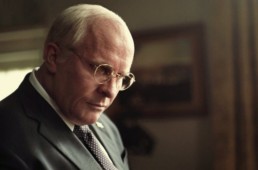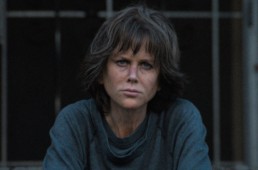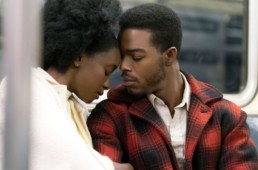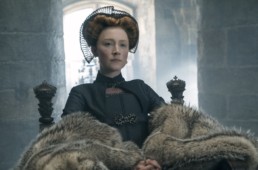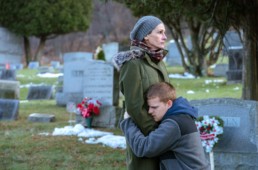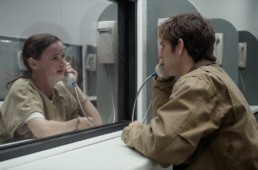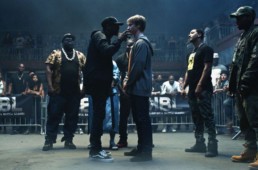'Vice' Review: Beware the Quiet Man
Mystery has always surrounded the life and legacy of Vice President Dick Cheney, second in command to then-President George W. Bush, as he stood seemingly in the shadows during a divisive eight-year term.
In Adam McKay's bio-pic satire Vice, already a frontrunner in the awards chatter, Cheney's life is examined in a "true-ish" fashion, along with some admittedly creative liberty. Cheney was a very secretive man after all, before and during his political reign, and with little concrete material to work with, McKay and company tell us from get-got go: "we did our fucking best."
A silent mastermind
At the time of this review, Vice holds the record as the most nominated film this year. Christian Bale transforms both literally and figuratively into the overweight social climber Richard 'Dick' Cheney, who jumped on an opportunity to attach himself to Donald Rumsfeld (Steve Carell) and ride the political wave into the White House. The film begins on the morning of September 11th, 2001, with Cheney and other Washington heavyweights watching the horrific events unfold. Surrounded by chaos, commotion, confusion, and fear, Cheney remains as cool as a cucumber and, if we are to believe McKay’s rendition, the one who truly lead this country to war. With George W. Bush (Sam Rockwell) as the nation's figurative leader, Cheney is portrayed as the silent mastermind quietly controlling the strings and loving his position of absolute power while he pushed political (and ethical) boundaries.
"Beware the quiet man," goes the saying, and Cheney proves this warning to be accurate. A booze-loving partier in his earlier years, which resulted in getting him kicked out of Yale, Cheney was forced to reign it in by his steadfast and loyal wife, Lynne (Amy Adams). Together, they would raise two daughters Mary (Alison Pill) and Liz (Lily Rabe) and live a comfortable life, but it was Cheney's power-hungry personality that eventually landed him in the White House. His career trajectory is fascinating, while at the same time horrifying, as a tangled web of politics is exposed (it's crazy to think how Watergate seemed like a simpler time in comparison to day's political climate).
Transforming into the political heavyweight (pun intended)
The stacked cast of actors playing infamous political figures adds to the film's already solid package. Bale adds both weight and a slightly stuttering, gravelly voice to the former VP. Carell is heartfelt and humorous, Adams is passionate and inspiring, Rockwell is goofy and childish. Other famous faces making an appearance are Tyler Perry as Colin Powell and Justin Kirk as Scooter Libby, both equally unrecognizable and phenomenal.
Shaking up the narrative with Shakespeare
Vice feels much like director Adam McKay's previous praiseworthy governmental introspective drama The Big Short, which is a multi-dimensional moving collage instead of a straight-forward drama. I wish McKay had taught my history class. I learned so much more about the happening of our government watching The Big Short and now Vice than during my 16 years of schooling. I credit this to McKay's unmatched way of using humor and unconventional film techniques- like running credits halfway through the film as a "gotcha" moment or breaking into a Shakespearean soliloquy- to shake up the narrative. Speaking of which, Jesse Plemons acts as the film's narrator and further explains important plot points with the help of info-graphics (his mysterious relationship to Cheney is explained later).
An eye-opening look at the smooth-talking, self-confident former VP
For a political film, Vice isn't pushing an agenda too hard one way or the other. Some facts can't be disputed, like the incredibly thin margin of 537 votes that tipped Bush and Cheney into the White House. Others may ruffle some right-wing feathers, like George W. Bush getting sloppy drunk and breaking a glass at a White House holiday party. There is, however, no denying the uncanny control Cheney was able to obtain through smooth-talking and self-confidence. From being the youngest chief of staff in history to essentially controlling the United States of America, Vice shows that Cheney's quest for power was silent... and deadly.
'Vice' is rated R for language and some violent images. 132 minutes. Opening everywhere this Christmas.
'Destroyer': Seeking Revenge in the City of Angels
Nicole Kidman appears worlds away from her posh and polished life in HBO's Big Little Lies as she assumes the role of a washed-up undercover federal agent in Karyn Kusama's drama, Destroyer.
A vehicle for Kidman to show she too can play dirty, Destroyer hangs in the balance of being a powerful, character-driven movie but its melodramatic and often frustrating storyline may find it challenging to connect with audiences. The film, which is being released in theaters on Christmas Day, may be devoid of holiday spirit, but there is no shortage of alcoholic spirits if that makes up for it.
Nicole Kidman is practically unrecognizable as she transforms into the disheveled detective Erin Bell, complete with a slight underbite and yellowed teeth. It's obvious that she's had a rough go of things as of late, when we first meet her, she is waking up in her car under a bridge. She arrives at the scene of a crime, a John Doe murder, and immediately is struck by two very specific clues on the unidentified man's body. First, a neck tattoo consisting of three consecutive circles, and second, a couple $100 bills with purple ink markings, indicating the money had been stolen. This is the starting point that sends Detective Bell down an obsessive spiral of delusion as she sets out to solve the mystery, alone.
There is so much more beneath the surface that makes this John Doe particularly captivating to Detective Bell. As told through a series of flashbacks from nine years ago, which act as a second narrative, we learn that Bell was placed undercover with a fellow officer, Chris (Sebastian Stan), to infiltrate and win over the trust of a drug-dealing gang in the California desert. Her time undercover was riddled with anxiety and heartache and, upon discovery of this newly deceased body, Detective Bell relives those tumultuous times by revisiting the members of the gang to finally seek justice.
Director Karyn Kusama's Los Angeles-set crime drama is captivating in its visual aesthetic. In certain scenes, like those that take place in the desert, the color is whitewashed and blown out, giving off a feeling of stuffy discomfort. It looks as if the sun is melting away Bell's exterior shell to reveal her inner truth, which she must hold onto in order to save her life. The film's soundtrack, composed by Theodore Shapiro, adds a beautiful, erratic quality to the cat and mouse game unfolding on screen.
The real anchor here is Kidman who, without a doubt, is the best part about Destroyer. She colors outside of the lines as we are used to seeing her in roles that are less physically demanding. Here she handles machine guns like a champion, takes punches to the gut without giving up, and has emotional breakdowns in nearly every scene. It’s an impressive performance, although at times Kidman sounds like she took a reference from Christian Bale's line delivery in The Dark Knight.
While Kidman's transformation is praiseworthy, her character development plays too heavy and melodramatic to not feel personally burdened by Bell’s misfortune. It's understood that Bell's life has been going downhill due to an awful event nearly ten years ago, yet there are many points in the film when I wondered why she was still obsessively reeling in the tragedy, despite having a child, a husband, and a career. What is the catalyst for living as a rambling alcoholic who doesn't ever change her clothes and sleep in her car? Wouldn't someone have intervened during those last nine years? And if not, how the hell has she kept her job as a detective for all this time if she consistently showed up drunk and disheveled?
Angelinos will appreciate Kusama's unique nods to the city, including multiple references to a Dodger game and a specific storage unit in Koreatown (only a couple blocks away from where I work). The payoff at the end brought a slight smile to my face- the only one I had throughout the duration of the film- take that to mean what you wish. There is no denying that Kusama has created a bold film starring a strong female protagonist, and while that is something we need more of onscreen, it's a shame that Destroyer falls somewhat flat as an inspiration for future filmmakers to emulate.
'Destroyer' is rated R for language throughout, violence, some sexual content, and brief drug use. 123 minutes.
'If Beale Street Could Talk' Review: Barry Jenkins Lenses Black Love
If there are any people who still believe that La La Land should have taken home the Best Picture Oscar, Barry Jenkins has reminded us why he deserved that divisive win.
While Damien Chazelle's Neil Armstrong biopic, First Man, received lukewarm reviews across the board, Jenkins has done the seemingly impossible in his follow-up feature to Moonlight by creating an equally moving and beautiful portrait with a familiar theme: love triumphs above everything else. Adapted from James Baldwin's 1974 novel, If Beale Street Could Talk is another instant classic as it tackles the radically unjust racial stereotype of being a black man in 1970s America and the lengths a young woman is willing to go for the love of her life.
There's no limit to love
Tish Rivers (KiKi Layne) and Alonzo 'Fonny' Hunt (Stephan James) were childhood best friends whose sweet friendship blossomed into a loving relationship as they grew into young adults. Tish is a gentle, innocent soul with a personality that perfectly compliments the gentlemanly gestures of Fonny’s genuine love. Although they are young- Tish in her late teens and Fonny in his early twenties- they have big plans and dreams for their future, which now includes a baby. But on the night Tish announces she is pregnant, a cause worthy of celebration, she is also dealing with the reality that her soul mate and best friend is sitting in a prison cell for a crime he didn't commit.
Tish, with the support of her family, rallies around Fonny's innocence and they do what they can to help clear his name. Tish's mother Sharon (Regina King) is especially crucial in tracking down the woman (Emily Rios) who falsely identified Fonny as her abuser and rapist, due to unlawful and extreme pressure from police to name a suspect. Aware of the woman's situation and her compliance in order to appease the cops instead of speaking the truth, Sharon goes the extra mile to beg and plead with her to set Fonny free from this accusation and stigma. Throughout the struggle of pregnancy, loneliness, and heartache, Tish knows she must be strong for Fonny and not let the emotional and psychological torture of her situation undermine her dreams of a fairytale future as a family of three.
Absolutely beautiful score and cinematography
The magic that Barry Jenkins captured in Moonlight is back in Beale Street and, any way you look at it, this film radiates beauty. The original score by Academy Award-nominated composer Nicholas Britell is layered with methodical orchestral sounds of bold strings and classical piano, each strum of the bow telling its own heartbreaking and emotive story. The inclusion of Al Green's For the Good Times- a song that lives in my own Spotify playlist entitled "Feels"- is another perfectly chosen song (although its placement in the scene is ironic given the context of the lyrics). Musically, this is the most powerful film of 2018. Visually, cinematographer James Laxton continues to create art within every frame. Laxton, who worked with Jenkins on Moonlight, brings the same intimacy and dreaminess that made him an Academy Award nominee back to the big screen (and another nomination seems obvious).
The power of words
Unlike Moonlight, however, Beale Street jumps the narrative timeline and instead floats in and out of Tish and Fonny's life together and apart. Another inventive technique is how the characters share their intimate conversations of distress and longing while looking directly into the camera. They address each other while visually addressing the audience, which can feel jarring at first. However, this tactic brings the story closer to home, which prompts the audience into an indirect yet burning desire to emotionally support Tish and her family in helping clear Fonny's name. This voluntary obligation stems directly from these intimate conversations, showcasing the power of words and the passionate people behind them.
A cinematic masterpiece
If Beale Street Could Talk is a cinematic masterpiece and the complete package: a powerful cast of mostly newcomers to the screen, a story that hits the emotional pinpoints, and a superb filmmaking team behind the scenes. Stephan James quietly commands the picture as a role model for men, and KiKi Layne equally captivates in her feature film debut. Powerful supporting performances from Brian Tyree Henry, Colman Domingo, and Dave Franco add to its emotional impact. When watching If Beale Street Could Talk, prepare to be engulfed in emotions as you witness the pureness and fragility of true love.
'If Beale Street Could Talk' is rated R for language and some sexual content. 119 minutes. Opening this Friday at ArcLight Hollywood and the Landmark.
'Mary Queen of Scots' Review: Who Runs the World? Girls
If you followed along with last year's Best Actress Oscars race, you probably remember that two of Hollywood's hottest talents – Saoirse Ronan and Margot Robbie – were both nominated for their performances as head-strong, dominant young women.
Well, both actresses are back for another Awards season, and again playing head-strong dominant young women. But this time out, Ronan and Robbie star opposite each other in the period costume drama Mary Queen of Scots, a historically-inspired account of the Scottish queen. It's an extravagant outing, with set pieces and costume designs that are sure to wow, and Ronan and Robbie command every moment they are onscreen. But there's no escaping that its slowly-evolving story is its biggest weakness. In what should have been a solid contender for ample awards consideration, Mary Queen of Scots may be bowing down to its competition come Oscar season.
Returning to reclaim the throne
Set in the 1500s, Saoirse Ronan plays the titular Mary Stuart, a widowed 18-year-old and former Queen of France who returns to her homeland of Scotland to reclaim her throne. With her youthfulness and progressive outlook on life – especially when it comes to religious practice – she instantly shakes up the deep-rooted and established traditions of the country which many find troubling. That includes her cousin, and – by default – rival to the throne, Queen Elizabeth I (Margot Robbie). With brains, beauty, plenty of suitors, and age on her side, Mary is a palpable threat to the Queen of England, who fears it's only a matter of time before Mary attempts to overthrow her. To secure their thrones and futures, the cousins resort to different tactics to assert their dominance, turning to their respective love interests Henry (Jack Lowden) and Robert (Joe Alwyn) for support in their years' long battle to follow.
Margot Robbie deserved more screentime
For a story that profiles powerful women, it makes sense that a female takes the helm behind the camera and this responsibility goes to first-time feature director Josie Rourke. Though it is inspiring to know that women are becoming more commonplace behind the camera, Rourke's limited experience is reflected throughout the film as the overall story is, for lack of a better word, boring. Because of this, the film, which is adapted from Dr. John Guy's biography My Heart Is My Own: The Life of Mary Queen of Scots, relies heavily on the star power of Ronan and Robbie, however, it's 24-year-old Saoirse that keeps the story afloat. Robbie's screentime is limited and while her performance and transformation into the aging Queen Elizabeth is commendable, it feels very underutilized.
Oh, so historically devout
While tangled plots and subplots are par for the course for any historical costume drama, what weakens Mary Queen of Scots is its duty to re-telling history event for event. Written by Beau Willimon (House of Cards), the film is chock full of political, religious, and sexist confrontations between the two Queens and their agitators, keeping the drama and emotional intensity at an all-time high. But as the film wears on and the historical events play out, we begin to lose these women's perspective on the entire royal affair at hand. On a positive note, the inclusion on screen is definitely worth noting. Men and women of color who would most likely not have been in the royal court back in the 1500s are prevalent and fantastic supporting characters.
God save these Queens
Ronan and Robbie exchange fiery performances each time they're onscreen, making for a rich film. An obvious first comparison about headstrong and ambitious young women jockeying for power is Yorgos Lanthimos' equally visually stunning period piece The Favourite, but in reality, these two films could not be more different. Where The Favourite bubbles over with giddy and humorously wicked tales of a female fight for power, in Mary Queen of Scots, the bubbles have gone flat. If God can save the Queen, perhaps he can help out Mary Queen of Scots, too.
'Mary Queen of Scots' is rated R. 124 minutes. Opening this Friday in select theaters, including the ArcLight Hollywood and Landmark.
Returning Home, Avoiding Relapse in 'Ben is Back'
Perhaps the perfect unintentional follow up to this year's family drama Beautiful Boy, starring Timothée Chalamet and Steve Carell, is the Lucas Hedges and Julia Roberts-fronted drama, Ben is Back.
While both films tell the story of a boy dealing with the damaging effects of substance abuse and a supportive family member doing whatever they can to keep him sober, that is where the similarities between the two films end. Ben is Back, directed by Lucas's father Peter Hedges, takes place after the addiction has been acknowledged and instead focuses on a young man trying to stay sober. In this touching portrait of the PTSD of a recovering addict, Ben is Back is a beautiful and heartbreaking story that showcases the special, undeniable bond between a mother and son.
The prodigal (newly-sober) son returns home
In a small, gloomy suburb of New York City, Ben (Hedges) surprises his family by leaving his sober living facility and showing up unexpectedly on Christmas Eve to spend the holidays at home with his loved ones, including his beloved dog, Ponce. To his mother Holly (Roberts), Ben is her prodigal son, and all her attention immediately shifts towards him and his needs. Holly's husband (Courtney B. Vance) and daughter (Kathryn Newton) worry that she is blinded by this motherly love and remain skeptical of Ben's true intentions. Being newly sober with some sixty-odd days under his belt, there is concern that the triggers at home may be too much for Ben, causing him to relapse. But Ben gives no outward appearance of slipping up, as he assures them he's turned a corner for good.
Promising to return to the sober living facility the next day, Ben agrees to stay by Holly's side so she can monitor his every move. The stakes become high for both Ben and Holly over this 24-hour trial period. For Ben, it is to keep the temptation of the real world at bay, and for Holly, it is driven by her ego in believing that she can keep Ben safe on her own. In the beginning, it seems as if everything will be okay until an unexpected break-in and subsequent theft of the family dog sparks a downward spiral that sees Ben pushed to his limit. As he sets out to confront the people from his past that he believes stole Ponce, Holly risks everything to desperately hold on to him and keep him safe no matter what.
A psychological masterclass in testing unconditional love
A psychological masterclass in testing the limits of familial love and the bond between mother and son, Ben is Back feels divided into two very distinct acts: the first being Ben's return and the second, his disappearance. Fueled by love and ego, Holly's hunt to find Ben is riddled with emotional turmoil as she learns the harrowing details of his former life as an addict. Watching her stark denial turn into a harsh reality is heartbreaking as she tries to digest details that no mother should ever have to learn about her own flesh and blood. Ben is not a bad kid, in fact, he is painted as quite the opposite throughout the entirety of the film. His intentions are genuine and solely based on protecting his family, but what he doesn't understand is that in order to save his family, he must unintentionally hurt them first.
Julia Roberts gives an awards-worthy performance
In one of her finest performances to date, one that should take her to the Academy Awards stage, Julia Roberts embodies the role of Holly with neurosis and overwhelming compassion. She does what any mother would do, even if it is morally wrong. Lucas Hedges also shines as a troubled teen, and his vulnerability is remarkable.
The ending is one of my favorite moments in a film this year
There are many elements that make Ben is Back a standout film in a year of exceptional films. One aspect is how the film takes place over a 24-hour time period, keeping the story tight and concise. Another is the phenomenal meditative soundtrack by composer Dickon Hinchliffe, whose previous works include Leave No Trace and Locke. The film ends on a sobering note that is perfectly supported by a chilling musical score, making it one of my favorite moments in a film this year. It may not be a lighthearted watch, but Ben is Back is a must-see.
'Back Roads' Review: Love Hurts in Alex Pettyfer's Directorial Debut
Alex Pettyfer has made a movie. The 28-year-old English-American actor debuted his first feature film, Back Roads, at the Tribeca Film Festival earlier this year and this Friday, the film hits select theaters across the country. Pettyfer steps into the director's chair from an actor's perspective, and the result is a very character-driven, emotionally-rich story about a dark, dysfunctional family dynamic and a young man's desperate attempts to keep everyone together despite the odds.
Harley tries to hold it all together
Set two years after the incarceration of his mother Bonnie (Juliette Lewis) for killing his abusive father, Harley (Pettyfer) has turned his daily life into a routine, albeit a rather mundane one. After his night shift at the local Robinson's grocery store, he returns to the family home in rural Pennsylvania to supervise his three younger sisters, beer in hand. As the oldest, he bears the responsibility of making sure the bills are paid and food is on the table. The younger two of his three sisters comply with Harley as their new parental figure, but it's Amber (Nicola Peltz) who is the thorn in his side. For some strange reason, Amber seems to get off on parading herself around him nearly naked, as well as having sex with random guys loud enough for Harley to hear, which eventually leads to her having sex with Harley against his will. Amber clearly has issues, so it's no surprise that Harley turns to alcohol to numb the pain. Harley also becomes friendly with his neighbor Callie (Jennifer Morrison), a married mother who is ten years his senior. Their flirty yet platonic relationship quickly becomes sexual with secret trysts in the woods, and Harley begins to develop strong feelings for her. Whether his attachment stems from the void of losing his maternal figure or his lack of sexual experience, Harley can't seem to let Callie go.
Click here for our exclusive interview with Alex Pettyfer, Jennifer Morrison, and Nicola Peltz.
Bombshell revelations are kept at an arm's distance
While the story of Back Roads is a bit problematic overall, mostly due to the character of Amber and lukewarm performance from Nicola Peltz, there are artful technical moments that keep the mind from dwelling on Amber's absurdities. The film is riddled with emotional bursts, and Pettyfer incorporates subtle behind the camera techniques that ground the performances and give them power. Most of the intense scenes take place behind glass- whether it's a burning couch seen through a window or Harley confronting his mother through the prison partition- there is always a layer in between the action. Perhaps this is to hint at Harley's detachment from.
The good guy finishes last
The theme of sacrifice, or falling on the sword for a loved one, is at the heart of Back Roads and because of this, the film doesn't have the typical "happy" ending. There is never a moment of relief for Harley and this torment doesn't lighten up throughout the entirety of the film. The decision to end Back Roads with title cards showing the statistics of child abuse feels heavy-handed (as if the audience has not already been through the trenches of Harley's distress and torment). Ultimately, the ending is unsatisfying because the good guy finishes last, so be prepared to feel some sort of way. Based on the 1999 novel by Tawni O'Dell, Back Roads is a starter film for Alex Pettyfer in every sense of the word, but I believe that he has the potential and skill to take this experience and grow in his next film.
'Back Roads' is not rated. 101 minutes. Opening this Friday at the Laemmle Monica Film Center.
https://www.youtube.com/watch?v=K_nkQQ-o1EY&ab_channel=SamuelGoldwynFilms
Alex Pettyfer, Nicola Peltz, and Jennifer Morrison Talk 'Back Roads'
The morning after the World Premiere of actor turned director Alex Pettyfer's debut, Back Roads, I had the opportunity to chat with him and his co-stars Nicola Peltz and Jennifer Morrison.
Set up in a room on the second floor of the Roxy Hotel in Tribeca, the cast looked sharp all dressed in black, morning coffees in hand. Back Roads centers on Harley (Pettyfer) a young man stuck in a lower-class town in Pennsylvania who is left to care for his three younger sisters after the shooting death of his abusive father and the arrest of his mother. When shocking family secrets emerge, Harley’s life begins to spiral downward, leading to a devastating conclusion that impacts the entire community. During our exclusive interview, we talk about where their passion for movies stemmed from, secret childhood dreams, and the difference between blockbuster films vs indie films. We begin:
Being a first-time director is hard. Very hard.
Alex Pettyfer: It was all hard, very hard, but I would have never been able to make this film without the people that I collaborated with. Being an actor can be a very solo journey, you know, you're telling a perspective from A to Z. As a filmmaker, you're telling a multitude of stories. What I learned is that being a filmmaker is such a collaborative, creative experience with everyone putting their own heart into the film. I think that's quite magical. [This experience] was very beautiful and I felt very supported. I'm so fortunate to work with people [including Juliette Lewis] that came on this film having this idea and vision as collaborating together.
Jennifer's reaction to seeing Back Roads for the first time on the big screen.
Jennifer Morrison: It was great! It was the first time I saw the film besides the bits and pieces from doing ADR and stuff. I was just so excited to see Alex's vision come to life on the screen. Not only is it a beautiful film but it really brings light to the subject matter of child abuse, and all of the things that come with the tragedy of that and how devastating that can be. I think it's really interesting to look at that in a piece of fiction and realize that that can bring so much empathy and awareness to an audience. I was really moved by that part of the film.
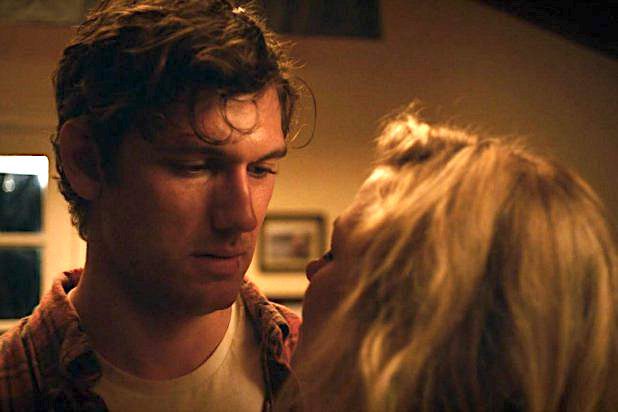
Nicola depended on the costumes to get into character.
Nicola Peltz: I'm a visual person, there were definitely pictures I saw that I was drawn to. Alex was nice enough to be very collaborative with what I wore [in the film]. I loved picking what my character wore and how she looked because when I put the clothes on it made me feel like a totally different person.
Alex Pettyfer: Good friends of mine are designers and Lee Daniels was at the premiere last night and they commented on how they thought you [Nicola] looked fantastic. My big anxiety was the clothes and how Nicola looked in the film. It was a concern because Nicola is such a beautiful woman, you don't want to glamorize [her actions]. Credit to Nicola, she had a very set vision of what she wanted to play and who she wanted to be. I think one of the most powerful scenes in the film is her with that raw emotion when [my character] leaves the room and she's left there.
Alex credits Pacino and De Niro for sparking his passion for film.
Alex Pettyfer: I wanted to be a racing driver, haha! When I was 15 I had done a few films like Alex Rider: Operation Stormbreaker and Tom Brown's Schooldays, and I met this guy, whose father was the distributor behind Stormbreaker, at the premiere. He came up to me and just wouldn't leave me alone. He said, 'Let's meet for coffee' and I was like, 'Sure.' We had this budding relationship, he was a cinephile– he loved film. I would go and spend the weekend with him, sleep on his floor in Mill Hill and we would watch The Deer Hunter, all of Pacino and De Niro's films. I watched hundreds of hours of these European films and films that I hadn't even heard of, and my love of film grew [because of] this guy. So instead of being on the racetrack on the weekend, I would rather go hang out with him. I think that's what sparked my taste for film.
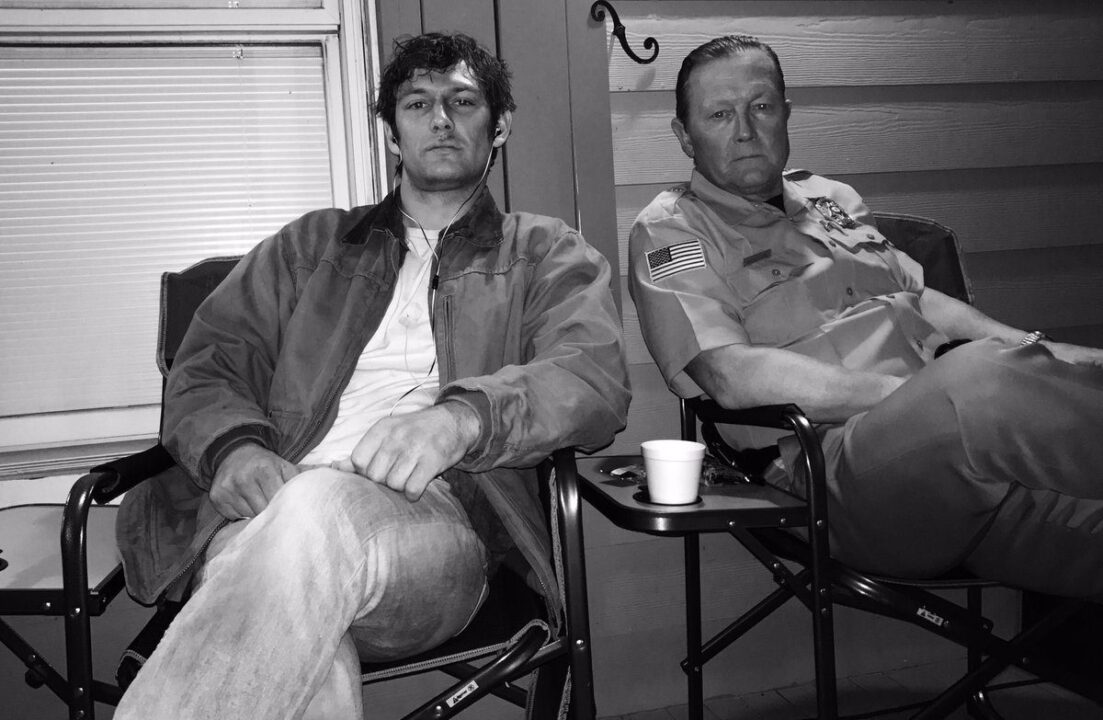
Jennifer credits her dad's consistent talking through movies for her love of filmmaking.
Jennifer Morrison: My dad is obsessed with movies. All movies. He's very indiscriminate of the movies that he loves and so he's always watching movies. I didn't even realize how much that was getting in me as a kid... it was just something he would do. He would watch and re-watch movies. Like Groundhog Day, he's probably seen it like 100 times! He does this really funny thing, and he still does it, where he talks through the movie, like 'Why would they do that?' I'm like 'I don't know Dad, I haven't seen it.' And if he has seen it he's like, 'Did you see that? Do you see that? That means something just so you know.' I'm like 'OK DAD' haha! As funny as it is now and as much as we tease him about it now, I think watching movies with him like that showed me the structure of storytelling. I was thinking of storytelling differently because of his questions and because of his comments. I had a love for film from a very young age because it was something I shared with my dad, but I also think I started to see it in a totally different light because of the way he would talk through the films.
That's amazing, does he know this?
Jennifer Morrison: No, but he's gonna find out!
Alex Pettyfer: I just love that he's seen Groundhogs Day 100 times.
Jennifer Morrison: Oh my God I can recite almost all of What About Bob?, all of Field of Dreams, most of Groundhogs Day...
Nicola's first passion was Ice Hockey.
Nicola Peltz: I grew up playing ice hockey...
Jennifer Morrison: That's amazing! And the most unexpected thing!
Nicola Peltz: Haha! Then I just wanted to act when I was 12, and my parents were really against it. Finally, I just tried it out. But I really wanted to be like an ice hockey player.
Jennifer Morrison: Are you super into the [Mighty] Ducks? That had to have been your favorite movie.
Nicola Peltz: Yeah, haha.
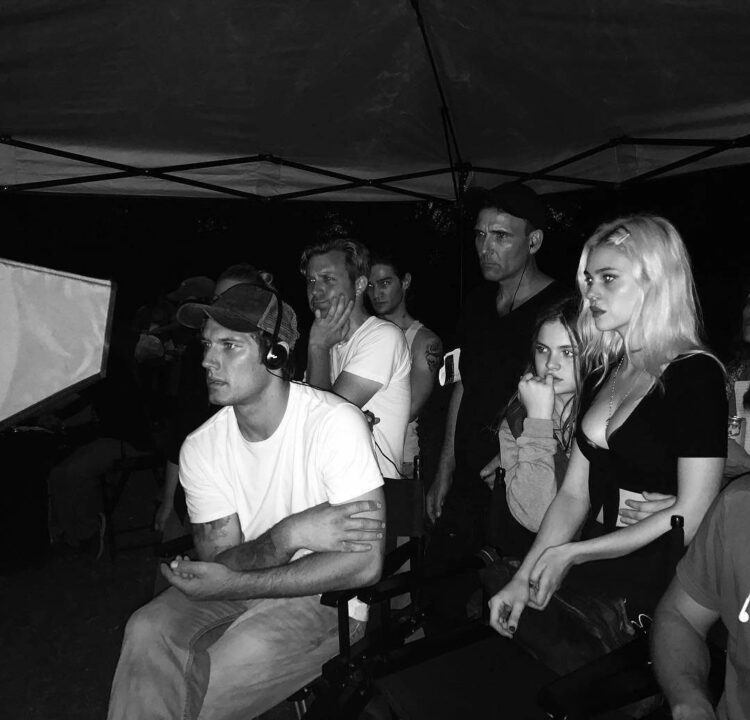
The vibe of a Blockbuster film vs Independent film like Back Roads.
Alex Pettyfer: There's more of an intimacy which works so much better when you're on a smaller film. I think it's much more raw. I think when you're on a bigger film you get lost in the imagination of what that is, that kind of spectacle. The grounded reality of when you work on a small film is you're very connected creatively, all together, you know? You're going on a journey together and that's a beautiful experience as an actor.
Jennifer Morrison: Yeah, it felt like a family. It felt like you're all there because you really love the material and you love the characters and you believe in the director's vision. Not because you're getting a payday or because you're comfortable. There's a different place that you're willing to go to with your vulnerability and your emotions because you're so invested. Watching the movie last night, I really felt like I left a part of myself on that screen and I can't say that I always feel that way. That is a real tribute to the kind of director that Alex is and that vibe that he set on the set. Yeah, smooth films.
Alex Pettyfer: I prefer being on small films. I can't explain it. When you're on a bigger film, you have these amazing long shoots, like six months, and you have a lot of waiting around. On smaller films, you're on such a short time schedule that your work is immediate. You don't have time to play around and so you have to really be fully prepared for what you want to do and the choices you make.
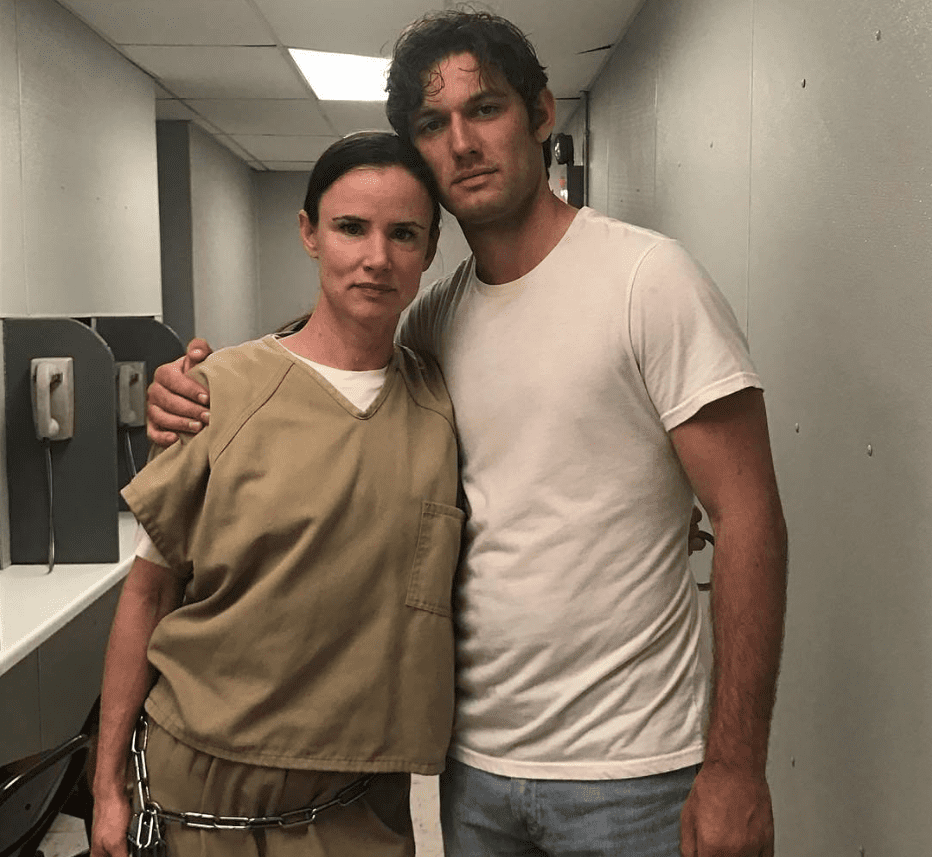
Kubrick inspired Pettyfer and his DP to shoot certain emotional scenes behind glass.
Alex Pettyfer: I said to my DP, Jared, that my favorite films are Kubrick films. I like the visual perspective of seeing something detached but detached in a way where you're still so immersed in it. It was really our collaboration, I don't take credit for those decisions. It was primarily Jared who came up with this idea– He said when you detach yourself from the perspective of someone's emotional journey, you're looking through a 2D visual. You have to relate that 2D visual into your own personal emotional journey and what has happened in your life.
Alex Pettyfer: When you detach yourself through glass, you're all a sudden of watching something and you're in [the character's] journey. So it's like a kind of like a misconception to the brain, to look at something through something else. You're all of a sudden watching someone's life and then your reimmersed back into the character. I thought that was an amazing thing. If you watch the scenes that are through glass like the couch burning and the Juliette Lewis scene, they're one takes, very long takes.
Alex Pettyfer: The couch shot is almost like a painting, the two kids are just standing there for a good 30 seconds. You're just like, 'What's going on?' That was a real risk as a filmmaker, you know, because other filmmakers could think you're trying to be egotistical or something, but it was a really selective message to try to entice the audience into the film even more on a perspective of attachment.
I Love...
Nicola Peltz: Dogs.
Jennifer Morrison: I need a list, my family, friends, dog...home. I was away so much for so long so home is a big deal for me.
Alex Pettyfer: I love unity. And love. I love love.
This interview originally ran on May 4th, 2018, during the Tribeca Film Festival
'Bodied' Review: Battle Rapper Gets Woke
Taylor Swift's go-to music video director- the creative force behind Bad Blood, Look What You Made Me Do, and Blank Space, among others- reunites with a past artist to bring the story of Bodied to the increasingly popular small screen format of YouTube Premiere.
Joseph Kahn, whose videos have racked up billions (yes, billions) of views in the last four years alone, continues to do what he does best by working once again with Eminem aka Slim Shady aka Marshall Mathers who acts as producer on this indie feature. The duo, who first collaborated on Eminem's 2002 hit Without Me, bring the fire to Bodied, an entertaining and introspective look at the underground rap battle scene, which also poses as a cultural celebration of this game and its inventive players.
With the ability to effortlessly drop rhymes like bombs in a war zone, Adam (Calum Worthy) has a secret skill that, on the surface, goes against his seemingly predetermined, white boy privilege. As a student at UC Berkley, Adam's love for the sport of battle rapping is the focus of his thesis paper, and he uses the opportunity to immerse himself in the local Oakland scene. One night, an encounter with his rapper idol, Behn Grymm (Jackie Long), forces Adam out of his comfort zone of passive spectator to amateur rapper, standing front and center with the big boys.
Much to the dismay of his neurotic, vegan girlfriend, literary critic father, and other affluent Berkley students who consider the dissection of what makes someone racist an acceptable form of dinner party conversation, Adam continues to excel and move up in the rankings of the rap scene. His raps, while incorporating the common tropes of violence and misogyny, remain very self-aware aware. Adam's privileged white perspective isn't lost on himself and is the subject of many self-deprecating and hilarious insults. Success was never the goal, but now that Adam finds himself matched against some of the biggest players in the game, he begins to question whether or not the strained relationships that have developed, as a result of his obsession with battling, are worth it in the end.
Like a male-centered counterpart to the Sundance-championed independent film Roxanne, Roxanne, Bodied is an equally engaging and all-encompassing hype film that will have you in awe of these divisive lyrical masterpieces. The film shows the depth and extreme talent one must have in order to engage in a battle, and those who are the most skilled make the spitting of insults look easy. With Adam as its white male protagonist, Bodied makes it a point to call out that his interest and acceleration is not an appropriation of black culture, rather an admiration of the poetic mastery of the written word that is on par with Nobel Peace Prize winners.
There's no doubt that Eminem brings his years of experience as a rapper to the film, even going so far as to poke fun at himself (which, in all fairness, is equally balanced out with abundant praise). "Eminem is the greatest battle rapper of all time", says Adam, in admiration of his ability to transcend race as a rapper, and even going as far as to call him the G.O.A.T. (Greatest of all Time). Watching Bodied changed my perspective on the role of the battle rapper, and while wrapped up as lighthearted fare with a provocative edge, Bodied is fully fun and entertaining film that may just change your perspective too.
'Bodied' is rated R for strong language and sexual content throughout, some drug use and brief nudity. 120 minutes. Now streaming on YouTube Premiere.

